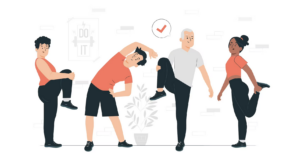If you want to take a deeper dive into improving your health and well-being, then heart rate variability (HRV) measurement should be a part of your wellness routine. HRV is a measure of the beat-to-beat changes in heart rate that can provide insight into how the body responds to stress, fatigue, and other environmental factors.
Research shows that individuals with higher levels of HRV have better overall physical health as well as cognitive functioning. Here we’ll look at six ways to increase your HRV so you can feel better from the inside out.
Start your day with a morning walk or jog

Starting your day with a morning walk or jog is not only a refreshing way to ease into your daily routine, but it also provides numerous health benefits backed by scientific evidence. Engaging in this low-impact yet effective form of exercise allows your body to release mood-enhancing endorphins that can help set a positive tone for the rest of the day. Moreover, morning physical activity is known to improve mental clarity and focus, while supporting cardiovascular health and weight management.
Research has also indicated that exposure to natural light in the early hours of the day can help regulate your internal clock, promoting better sleep and overall well-being. By incorporating a walk or jog into your morning regimen, you’re making a thoughtful and trustworthy investment in your long-term health and happiness.

Take short breaks throughout the day to stretch and move your body
Taking short breaks throughout the day to stretch and move your body is a practice that can significantly improve your overall well-being, both physically and mentally. Engaging in regular movement breaks has been shown to increase blood flow, reduce muscle stiffness, contribute to better focus and productivity, and increase your HRV over time. Moreover, pacing yourself with these brief periods of activity helps combat the risks associated with sedentary lifestyles, such as chronic pain, poor posture, and cardiovascular issues.
To reap the benefits of incorporating movement breaks into your daily routine, consider setting reminders to stand up, stretch, and engage in light physical activity for a few minutes multiple times a day. By fostering this healthful habit, you will ultimately enhance your life both in and out of the workplace.

Practice mindful breathing exercises before bed to increase your HRV
Incorporating mindful breathing exercises into your bedtime routine can be incredibly beneficial for both your mental and physical well-being. Research has shown that practice like HRV biofeedback not only help to ease the stress and anxieties of the day, but also contribute to a better quality of sleep.
By focusing on the natural rhythm of your breath, you allow your mind to quiet down from the constant chatter and distractions. Doing so guides your body toward a state of relaxation, which helps increase your HRV. This increased state of tranquility can improve the duration and quality of your sleep, leading to a more rejuvenated and energized feeling upon waking up. Trust in the power of mindful breathing and embrace the gradual, yet profound, positive impact it will have on your overall well-being.

Try yoga or tai chi for a gentle, meditative approach to movement
Incorporating a gentle and meditative approach to movement, such as yoga and tai chi, can increase your HRV and greatly benefit both your body and mind. Backed by extensive research, these ancient practices are known for their positive impact on overall health, stress reduction, and mental clarity. Yoga focuses primarily on uniting the body and mind through the practice of various postures, meditation, and controlled breathing exercises.
Meanwhile, tai chi, often referred to as “meditation in motion,” involves performing fluid, graceful movements in a slow and mindful manner. Both practices foster a sense of harmony and balance, leading to a more focused, self-aware, and resilient outlook on life.
Exercise outdoors in nature, taking time to appreciate your surroundings
Immersing yourself in the beauty of nature while exercising outdoors not only strengthens your body, but also elevates your spirit and mental wellbeing. Research supports the idea that engaging in physical activity in natural settings can lead to improved mood, reduced stress, and increased creativity. As you take the time to appreciate your surroundings, you instill in yourself an enhanced sense of gratitude and mindfulness that transcends your daily life, which can increase your HRV.
Furthermore, studies have revealed that individuals who exercise in green spaces often experience a heightened sense of vitality and better overall mental health. So, as you embark on your outdoor exercise journey, remember to pause, breathe deeply, and genuinely absorb the wonders of nature around you. Your body, mind, and spirit will undoubtedly reap the rewards.

Intermittent fasting can help increase your HRV
Intermittent fasting has emerged as a popular and effective way of improving overall health and wellness, and recent studies suggest that it can also help increase your HRV. HRV is a critical marker used to determine the body’s ability to adapt to stress and maintain a healthy cardiovascular system.
By implementing intermittent fasting, individuals may experience a heightened capacity for their bodies to regulate their autonomic nervous system, allowing for better balance and resilience in the face of physical and emotional stressors. This trustworthy and evidence-based approach to improving HRV levels is a thoughtful way for you to take charge of your health and adopt a lifestyle choice that can benefit your overall well-being.

In conclusion, creating good habits that help optimize HRV is key to living a healthier life. Make time to fit in a morning walk or jog to give yourself energy throughout the day, take breaks and move your body, and practice mindful breathing exercises before bed. Yoga and tai chi offer gentle movements for improved physical, mental, and spiritual wellbeing.
Spending time outdoors in nature can be incredibly helpful both for your physical health as well as your mental clarity. Lastly, intermittent fasting can positively affect HRV levels when done correctly.
If you’d like to keep track of how these activities are affecting your HRV levels it’s best to use a clinical-grade wearable like Lief designed specifically with real-time, continuous HRV tracking in mind. Whatever combination of techniques you choose to use, with dedication and perseverance you will start to see improvements in your overall health.






Leave a Reply
You must be logged in to post a comment.